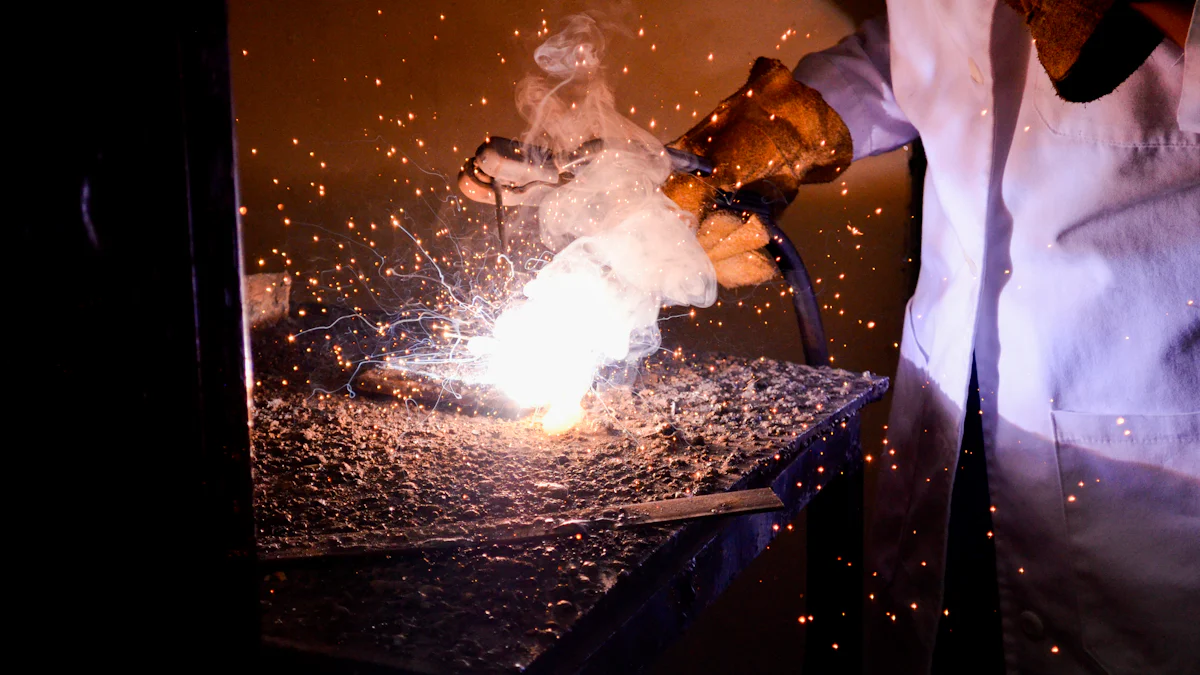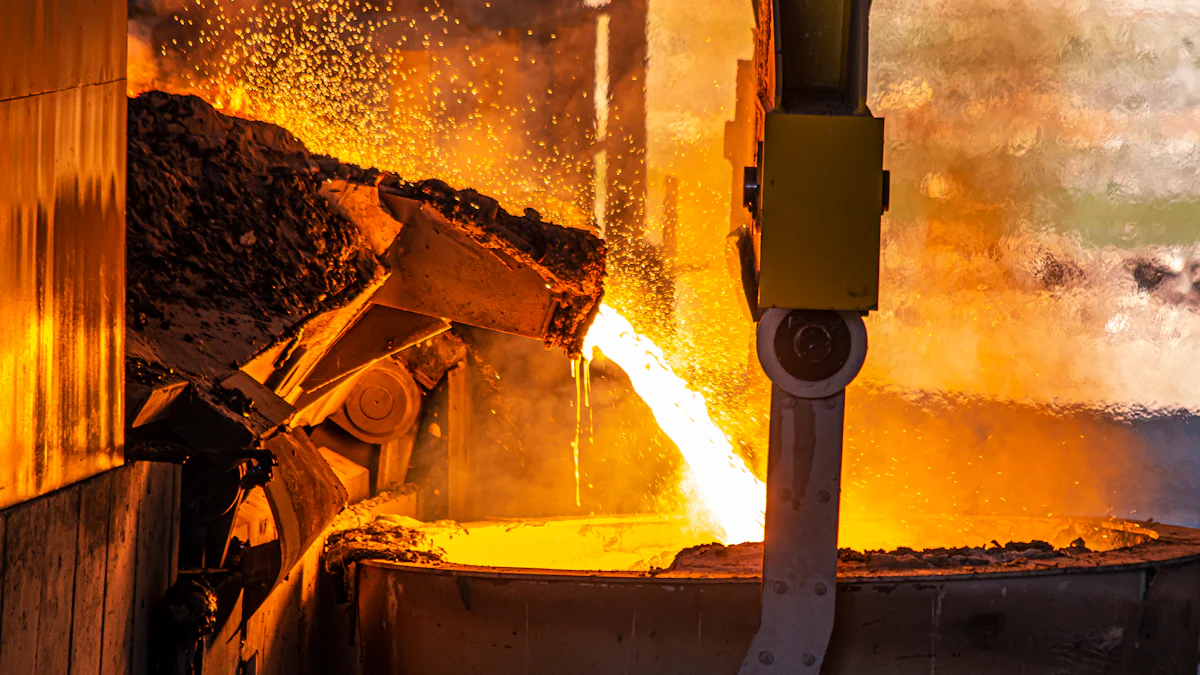How to Select the Best Aluminium Bar Rod for Your Needs

Choosing the right aluminum round bar is essential for your project's success. It can make a significant difference in performance and durability. When you select an aluminum bar, consider factors like strength, corrosion resistance, and workability. Each of these elements plays a crucial role in how well the bar will meet your needs. Remember, overlooking these details can lead to costly mistakes down the line. So, take your time to evaluate your options carefully, especially when looking for aluminium bar rod in stock.
Key Takeaways
Evaluate the specific needs of your project, including strength, weight, and corrosion resistance, to select the most suitable aluminum alloy.
Understand the different aluminum alloy series, such as 2000, 5000, 6000, and 7000, to make informed decisions based on their unique properties and applications.
Pay attention to key specifications like diameter and length, as these factors significantly impact the performance and suitability of the aluminum bar for your project.
Research and compare suppliers to find reliable sources for aluminum bar rods, ensuring you consider quality, price, and delivery options.
Avoid common mistakes by thoroughly reviewing project requirements and specifications to prevent costly errors in material selection.
Types of Aluminum Alloys

When it comes to aluminum alloys, you have several options to choose from. Each type has unique characteristics that can impact your project. Here are some of the most common aluminum alloys you might encounter:
2000 Series: These alloys primarily consist of aluminum and copper. For instance, aluminum 2024 is popular in aircraft manufacturing due to its high strength.
5000 Series: Featuring magnesium as the main alloying element, these alloys offer excellent corrosion resistance and weldability. Aluminum 5083 is a common choice for marine applications.
6000 Series: This series combines magnesium and silicon, making it versatile for welding and structural applications. Aluminum 6061 is the most widely used grade in this category.
7000 Series: Known for high strength, these alloys use zinc as the primary alloying element. Aluminum 7050 and 7075 are extensively used in the aerospace industry.
Properties of Each Alloy
Understanding the properties of these alloys helps you make informed decisions. Here’s a quick comparison of some key properties:
Aluminum Alloy Type | Density (g/cm³) | Thermal Conductivity (W/mK) | Electrical Conductivity (%IACS) | Coefficient of Thermal Expansion (10^-6/K) | Specific Heat Capacity (J/kg K) |
|---|---|---|---|---|---|
1100 | 2.71 | 222 | 61.8 | 23.6 | 904 |
2024 | 2.78 | 121 | 49 | 23.2 | 875 |
6061 | 2.70 | 152 | 43 | 23.2 | 897 |
7075 | 2.81 | 130–150 | 37 | 23.6 | 714.8 |
Choosing the Right Alloy for Your Project
Selecting the right alloy depends on your specific needs. Consider factors like strength, weight, and corrosion resistance. For example, if you need a lightweight yet strong material, the 7075 alloy might be your best bet. On the other hand, if you’re working on a project that requires good weldability, the 6061 alloy could be ideal.
Always think about the application. Whether you're sourcing aluminum bar rod in stock for industrial use or a DIY project, understanding these alloys will help you choose wisely.
Key Specifications to Consider
When selecting an aluminum bar rod, you need to pay attention to several key specifications. These details can significantly impact your project's success.
Diameter and Length
The diameter and length of aluminum round bars vary widely. You can find standard sizes, but custom cuts are often available to meet your specific needs. Here’s a quick reference table for common dimensions:
Diameter (mm) | Length (mm) |
|---|---|
5 | 100 |
420 | 6000 |
Most aluminum round bars come in lengths of 12 ft. or 16 ft., but you can always request custom lengths. Choosing the right diameter is crucial, as it affects both the strength and weight of the bar.
Alloy Composition
The alloy composition plays a vital role in the performance of aluminum round bars. Different alloying elements contribute to properties like strength, corrosion resistance, and machinability. For instance, if you need a bar that withstands harsh environments, you might opt for a magnesium-based alloy. Understanding these compositions helps you select the best aluminum bar rod for your project.
Weight and Strength Considerations
Aluminum round bars are significantly lighter than steel due to their low density. The weight of a bar depends on its diameter, length, and specific alloy. For applications where weight reduction is crucial, such as in aviation, large-diameter aluminum bars are ideal. Innovations in alloy formulations have enhanced the strength-to-weight ratio, making aluminum suitable for demanding conditions while keeping it lightweight.
By considering these specifications, you can ensure that you choose the right aluminum bar rod in stock for your needs.
Applications of Aluminum Round Bars

Aluminum round bars have a wide range of applications across various fields. Understanding where and how you can use them helps you make the best choice for your project.
Industrial Uses
In the industrial sector, aluminum round bars shine due to their lightweight and durable nature. Here are some key applications:
Aerospace: You’ll find aluminum round bars in aircraft construction, especially in fuselage frames and landing gear. Their strength-to-weight ratio and corrosion resistance make them ideal for this demanding industry.
Automotive Components: These bars play a crucial role in automotive manufacturing. They’re used in suspension components, engine parts, and body structures, helping improve fuel efficiency and overall vehicle performance.
Marine Equipment: Aluminum round bars are perfect for constructing boat and ship components. Their resistance to corrosion in saltwater environments makes them a popular choice for masts and hull structures.
DIY Projects
If you’re a DIY enthusiast, aluminum round bars can be a game-changer. You can use them for various projects, such as:
Furniture Making: Create stylish and modern furniture pieces. Aluminum bars can serve as legs or frames for tables and chairs.
Home Decor: Use them to craft unique wall art or decorative items. Their sleek look adds a contemporary touch to any space.
Gardening Tools: Build lightweight and durable tools or supports for your garden. Aluminum bars can withstand the elements while remaining easy to handle.
Specialty Applications
Aluminum round bars also find their way into specialty applications. Here are a few examples:
Medical Equipment: In the medical field, these bars are used for making lightweight and corrosion-resistant equipment.
Sports Equipment: You’ll see them in various sports gear, from bicycle frames to gym equipment, where strength and weight matter.
Architectural Elements: Aluminum round bars can enhance architectural designs, providing both structural support and aesthetic appeal.
By understanding these applications, you can better determine how aluminum round bars fit into your projects. Whether you’re looking for aluminium bar rod in stock for industrial use or a personal project, knowing their versatility will guide your selection.
Tips for Sourcing and Purchasing Aluminium Bar Rod In Stock
Finding the right aluminum bar rod can feel overwhelming, but with the right approach, you can simplify the process. Here are some tips to help you source and purchase aluminum bar rods effectively.
Finding Reliable Suppliers
Start by researching suppliers in your area or online. Look for companies with a solid reputation. You can check customer reviews and ratings to gauge their reliability. Here are some tips to find trustworthy suppliers:
Ask for Recommendations: Talk to colleagues or friends in your industry. They might have valuable insights.
Check Certifications: Ensure the supplier meets industry standards. Certifications can indicate quality and reliability.
Visit Their Website: A professional website often reflects a reputable business. Look for detailed product information and customer support options.
Comparing Prices and Quality
Once you have a list of potential suppliers, it’s time to compare prices and quality. Don’t just go for the cheapest option. Consider these factors:
Request Quotes: Get quotes from multiple suppliers. This helps you understand the market rate.
Evaluate Quality: Ask for samples if possible. Inspect the quality of the aluminum bar rod before making a bulk purchase.
Look for Discounts: Some suppliers offer discounts for bulk orders. Don’t hesitate to ask about any ongoing promotions.
Understanding Delivery Options
Delivery can impact your project timeline, so it’s crucial to understand your options. Here’s what to consider:
Shipping Times: Ask suppliers about their shipping times. You want to ensure your aluminum bar rod in stock arrives when you need it.
Shipping Costs: Factor in shipping costs when comparing prices. Sometimes, a lower price can come with higher shipping fees.
Local Pickup: If you’re close to the supplier, consider picking up the materials yourself. This can save you time and shipping costs.
By following these tips, you can confidently source and purchase the right aluminum bar rod in stock for your needs.
Common Mistakes to Avoid
When selecting aluminum bar rods, you can easily make mistakes that impact your project. Here are some common pitfalls to watch out for:
Overlooking Specifications
One of the biggest mistakes you can make is overlooking specifications. This can lead to serious issues down the line. Here’s how:
Vague objectives can cause misunderstandings, leading to project delays and budget overruns.
Underestimating complexity can create unrealistic timelines, resulting in frustration.
Ignoring input from stakeholders can mean missing critical requirements, which may lead to costly changes later.
Inadequate risk management can overlook potential risks, escalating into major issues if not addressed early.
Overlooking integration needs can create compatibility issues, increasing costs and delays.
Insufficient detail in technical requirements can cause miscommunication, resulting in a product that doesn’t meet your needs.
Neglecting post-launch support can create difficulties in managing or troubleshooting the system after launch.
Ignoring Project Requirements
You should always keep your project requirements front and center. Ignoring them can lead to selecting the wrong aluminum bar rod. Ask yourself:
What are the specific needs of your project?
Are there any environmental factors to consider, like exposure to moisture or chemicals?
Do you need a specific strength or weight capacity?
By answering these questions, you can avoid costly mistakes and ensure you choose the right material.
Failing to Research Suppliers
Lastly, don’t skip the research phase when it comes to suppliers. Failing to do so can lead to poor-quality products or unreliable service. Here’s what you should do:
Look for suppliers with good reviews and a solid reputation.
Compare prices and quality before making a decision.
Ask for samples to evaluate the material firsthand.
Taking the time to research suppliers can save you headaches later on. By avoiding these common mistakes, you’ll be better equipped to select the best aluminum bar rod for your needs.
Selecting the right aluminum round bar is crucial for your project's success. Remember to consider all factors before making a purchase. Here’s a quick recap of the benefits you gain from using the right material:
Highly formable and easy to work with
By choosing wisely, you ensure durability and performance in your projects. So, take your time, do your research, and enjoy the advantages that come with the right aluminum round bar!
FAQ
What is the best aluminum alloy for outdoor use?
For outdoor applications, the 5000 series alloys, like 5083, are ideal. They offer excellent corrosion resistance, making them perfect for marine environments and structures exposed to the elements.
How do I determine the right diameter for my project?
Choose the diameter based on your project's strength and weight requirements. Larger diameters provide more strength but add weight. Consider the balance between these factors for optimal performance.
Can I weld aluminum round bars?
Yes, many aluminum alloys, especially those in the 6000 series, are weldable. Ensure you use the right filler material and welding technique for the best results.
How do I maintain aluminum round bars?
To maintain aluminum round bars, clean them regularly with mild soap and water. Avoid harsh chemicals that can damage the surface. For outdoor use, consider applying a protective coating.
Where can I find aluminum round bars in stock?
You can find aluminum round bars at local metal suppliers, hardware stores, or online retailers. Always check for reliable suppliers with good reviews to ensure quality.